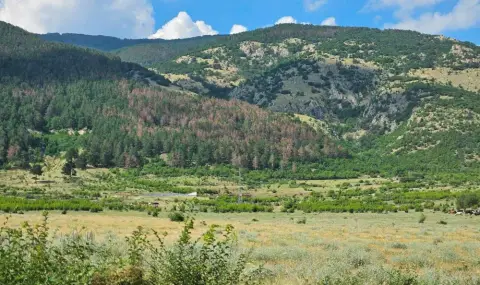Forests in Bulgaria occupy over 39% of the country's territory. They perform numerous ecological, social and economic functions, and for this reason it is important to maintain them in good health.
„To date, permanent aging of forests is observed. They are mainly coppice (nearly 48%) and coniferous crops, which are short-lived“, explains Eng. Petar Dishkov, an expert from the Bulgarian Forestry and Forestry Commission. According to him, our country is critically lagging behind in the renewal of forests and their transformation into seed crops. This creates prerequisites for future environmental problems - drying, attacks by pests and mass disturbances from biotic and abiotic factors. Dishkov predicts that a change in the landscape can also be expected. Therefore, there are already visible signs - the replacement of forests with shrubs and bare areas. The lack of effective care for forest resources could also lead to an increase in fires.
„On the other hand, the quality of the harvested wood is also deteriorating. Currently, 75% of the harvested broadleaf wood is for firewood - i.e. the worst quality. This limits the opportunities for the wood market, reduces the income of forest enterprises, and reduces the added value of wood products. In this way, our country is not fulfilling the priorities in the European Forest Strategy 2030 for the production of products with a long life cycle and high added value“, also commented Eng. Dyskov.
The reasons for all these problems are related to the failure to implement the planned forestry activities and insufficient planning. Not only is the cultivation of young forests without material extraction not being implemented, but also the planned regeneration and regeneration fellings. According to this indicator, the implementation for 2024 for state forests is 74%. If we compare the use in other European countries, on average 80% of the growth is harvested from forests, and in our country less than 50%. Which means that we plan little and at the same time we implement even less. The lack of active care for forests leads to health problems, including deforestation. Dishkov gives the example of Croatia, which produces quality oak wood, using about 75% of the growth.
How can we have healthy forests from which to harvest quality wood and from it to create products with a long life cycle, high added value, storing carbon dioxide? According to Dishkov, the answer can be found in classical silviculture, but there are also newer methods - for example, the Saarland method, which was popularized among our foresters by Dr. Eng. Martin Borisov, practicing in Germany.
In order to realize all these functions of forests in our country, a change in the way logging is carried out and a transition to modern mechanized logging is necessary. According to a study by the University of Eastern Finland, 90% of wood harvesting in Western Europe is mechanized. Unfortunately, in Bulgaria this percentage is 2%. This means that logging in our country is at an extremely outdated level. “If we compare it with other industries - let's imagine how agricultural producers still use brushcutters instead of harvesters, fishing is carried out only with fishing rods, without nets, or in construction, concrete is mixed by hand. This increases the price of the product, worsens the quality and leads to a loss of competitiveness“, the expert adds.
Forestry, together with the forest industry (woodworking and furniture production), directly creates over 60,000 jobs and provides over 3% of the country's GDP. Those employed in these sectors have a wide variety of profiles and varying degrees of qualification and education. We are talking about hundreds of jobs, especially in mountainous and semi-mountainous regions, which are threatened by depopulation. All this means that if we fail to protect the forests and do not develop economic activity in them, we will lose a priceless resource, leaving many people without a livelihood.
